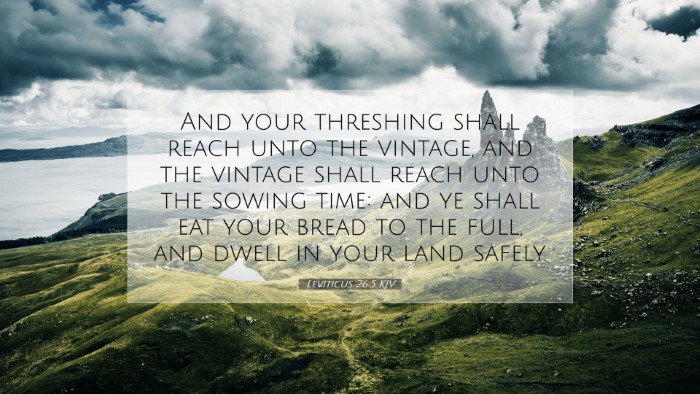Leviticus 26:5 - Summary and Commentary
Bible Verse: "And your threshing shall reach unto the vintage, and the vintage shall reach unto the sowing time: and ye shall eat your bread to the full, and dwell in your land safely."
Overview
This verse from Leviticus 26 offers a promise of abundant blessings for obedience to God's commandments. It connects various agricultural processes that symbolize fertility and prosperity, detailing how God rewards faithfulness with abundance and security.
Commentary Insights
Matthew Henry's Commentary
Matthew Henry highlights the significant implications of this verse for the Israelites. The promise of uninterrupted cycles between threshing, vintage, and sowing reflects the ideal agricultural life that God intended for His people. Henry notes that this divine blessing illustrates God's care and provision, emphasizing that obedience leads to stability and sustenance.
- Thresing and Vintage: The reference to "threshing" and "vintage" signifies two key points in the agricultural calendar. The blessing implies that these processes will overlap, indicating extraordinary abundance.
- Safety in the Land: Henry stresses that the promise of safety ("ye shall dwell in your land safely") serves both a physical and spiritual dimension. Living securely under God's protection ensures that the people can enjoy the fruits of their labor without fear of intrusion or calamity.
Albert Barnes' Notes
Albert Barnes provides a contextual understanding of Leviticus 26, elucidating the covenant relationship between God and Israel. He notes that this verse emphasizes not just temporal blessings but also spiritual significance. God's covenant includes promises that are contingent upon obedience and faithfulness.
- Connected Cycles: Barnes reflects on the seamless transitions between harvesting and planting, suggesting that in God's favor, the land will yield abundantly without the usual setbacks caused by pestilence or drought.
- Spiritual Lesson: He emphasizes the importance of recognizing these physical blessings as signs of God's presence and favor, teaching the people to view their prosperity as intertwined with their spiritual commitment to Him.
Adam Clarke's Commentary
Adam Clarke provides an in-depth examination of the expectations laid out in this verse. He elaborates on the metaphorical richness of the terms used, indicating that they symbolize a comprehensive state of wellbeing for the community.
- Covenantal Blessings: Clarke underscores that the blessings mentioned are specific to the covenant community of Israel, suggesting they reflect a unique relationship with Yahweh. This also serves as an incentive for obedience.
- Consumption and Satisfaction: The phrase "ye shall eat your bread to the full" indicates not only abundance but also satisfaction and contentment in God’s provision. Clarke articulates that such blessings should lead the people to gratitude and further dedication to God.
Theological Implications
The blessings outlined in Leviticus 26:5 have profound theological implications. The intertwining of agricultural metaphors showcases God’s sovereignty over creation and His desire for His people to thrive.
- Covenant Faithfulness: The faithful adherence to God's commandments is tied to the blessings received, emphasizing a robust understanding of covenant theology.
- God’s Care for His People: The verse illustrates not only God's promise for abundance but also His imminent care for their physical needs, reflecting the holistic nature of God's salvation and provision.
Practical Applications
The implications of Leviticus 26:5 extend beyond ancient Israel and remain relevant today. Pastors, leaders, and laypeople can draw several key applications:
- Embrace Obedience: Understanding the blessings tied to obedience encourages the faithful to remain committed to God's teachings.
- Celebrate God’s Provision: Recognizing God's continuous provision in various life aspects cultivates a spirit of gratitude and worship.
- Foster Community Wellbeing: Leaders should advocate for a collective experience of sufficiency and safety, recognizing their role in building a nurturing community that reflects God's kingdom.
Conclusion
Leviticus 26:5 serves as a profound reminder of God's promises and the blessings associated with obedience. Commentaries from Matthew Henry, Albert Barnes, and Adam Clarke each contribute layers of understanding regarding the promise of security and abundance. As we reflect on this verse, may we be inspired to pursue a covenant relationship that anticipates God's faithful provision in our lives and communities.


